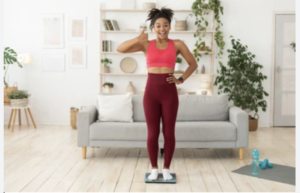Cognitive-behavioral therapy (CBT) is a therapeutic approach that focuses on the interplay between thoughts, feelings, and behaviors.
In the context of fitness goals, CBT can be applied to reshape negative thought patterns and cultivate healthier attitudes toward exercise and body image. By identifying and challenging self-limiting beliefs, individuals can shift their mindset to be more positive and constructive.
CBT encourages setting realistic, achievable goals and breaking them down into manageable steps, fostering a sense of accomplishment. Through positive visualization and behavioral activation, individuals can enhance motivation, develop a consistent exercise routine, and establish a positive relationship with their bodies.
Additionally, CBT addresses self-compassion, emphasizing the acceptance of setbacks and imperfections, ultimately contributing to a more sustainable and fulfilling fitness journey.
Cognitive-behavioral techniques can be powerful tools to help individuals improve motivation and develop a positive relationship with their bodies when working towards fitness goals. Here are some strategies:
- Identify and Challenge Negative Thoughts:
- Negative Self-Talk: Replace negative thoughts with positive affirmations. Instead of saying, “I can’t do this,” say, “I’ll do my best and improve over time.”
- Cognitive Restructuring: Challenge and reframe negative beliefs about your body and fitness abilities. For example, replace “I’m not good at this” with “I am improving with consistent effort.”
- Set Realistic Goals:
- SMART Goals: Make your goals Specific, Measurable, Achievable, Relevant, and Time-bound. This makes them more manageable and increases the likelihood of success.
- Break It Down: Divide larger goals into smaller, more achievable tasks. Celebrate small victories to boost motivation.
- Positive Visualization:
- Imagery: Visualize yourself succeeding in your fitness pursuits. Create a mental image of yourself enjoying exercise and feeling confident in your body.
- Positive Self-Image: Focus on the aspects of your body that you appreciate rather than dwelling on perceived flaws.
- Behavioral Activation:
- Start Small: Begin with small, manageable exercise routines and gradually increase intensity. This helps build a habit without overwhelming yourself.
- Consistency: Establish a routine. Consistency is key to forming habits and seeing progress.
- Mindful Eating:
- Pay Attention: Be mindful of what and how you eat. Listen to your body’s hunger and fullness cues rather than eating out of habit or emotion.
- Savor the Experience: Enjoy your meals and appreciate the nourishment they provide.
- Self-Compassion:
- Be Kind to Yourself: Treat yourself with the same kindness you would offer a friend. Acknowledge that setbacks happen, and it’s okay.
- Challenge Perfectionism: Accept that nobody is perfect. Embrace progress over perfection.
- Social Support:
- Connect with Others: Join fitness classes, clubs, or find a workout buddy. Positive social interactions can boost motivation and provide accountability.
- Share Your Goals: Letting others know about your fitness goals can create a supportive environment.
- Focus on Intrinsic Motivation:
- Find Enjoyable Activities: Choose exercises you genuinely enjoy to make fitness more sustainable.
- Reflect on Values: Connect your fitness goals with your core values, emphasizing the importance of health and well-being.
- Track Progress:
- Keep a Journal: Record your workouts, achievements, and positive feelings. Reflecting on progress can reinforce motivation.
- Celebrate Achievements: Recognize and celebrate milestones, whether they are related to fitness improvements or changes in mindset.
Remember, developing a positive relationship with your body and staying motivated is an ongoing process. Combining these cognitive-behavioral techniques with a consistent effort over time can contribute to a healthier and more fulfilling fitness journey.
Join our Facebook Group, Breast Implant Illness Rejuvenation And Education With Christina.
Or find me on Instagram at @sizehappy__
Not medical advice.





